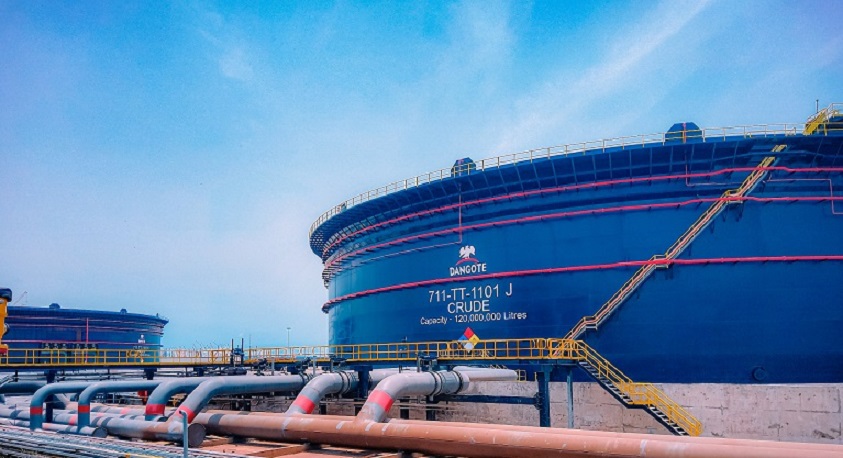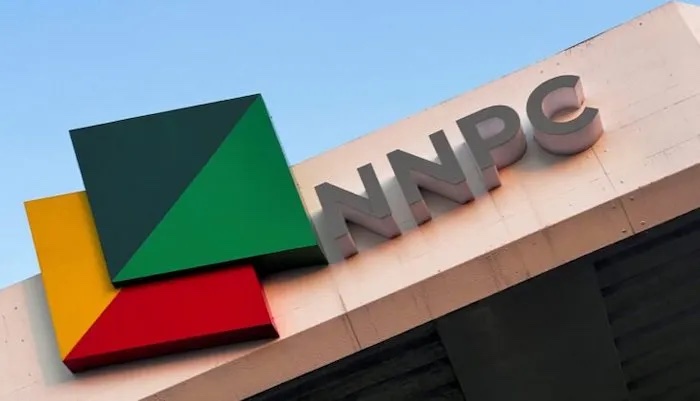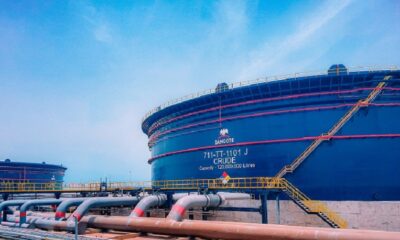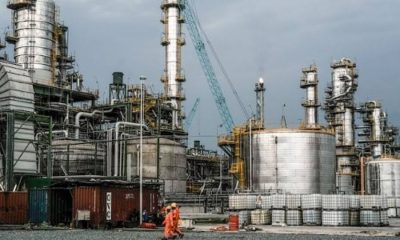Business
Depot Price Hike: Marketers Jostle To Take Advantage Of Dangote Refinery’s Bulk-Purchase Incentives

Attracted by the bulk-purchase agreement incentives being offered by the Dangote Petroleum Refinery, more oil marketers in Nigeria are jostling to be listed as beneficiaries of the agreement.
The leading conglomerate made the disclosure in a statement on Friday, in Lagos.
It was gathered that the bulk-purchase agreement, the petroleum marketers reasoned, offers a guaranteed price stability as against purchase from depot owners whose price is opened to incessant upward review as has just been announced.
ALSO READ: IGP Opens Up On Budget Presentation Drama
Recall that two prominent players in Nigeria’s downstream oil and gas sector – Ardova Plc and Heyden Petroleum – have entered into a bulk purchase agreement with the Dangote Petroleum Refinery after MRS; a situation they have leveraged on to sell petroleum at a much cheaper pump price.
The depot owners recently jerked up their loading price to N950 per liter from N909 citing increase in the price of crude oil in the international market, a situation that has forced most independent marketers to raise their pump price too to reflect the new higher price from the depot owners.
The Independent marketers are referring to the benefits of the bulk-purchase agreement with Dangote Refinery as being enjoyed by the three leading oil marketers, MRS, Ardova Plc and Heydey who have entered into the purchase agreement with Dangote refinery and are able to retain their lower pump price.
National President of Independent Petroleum Marketers Association (IPMAN), Alhaji Abubakar Maigandi Garima confirmed that the association members’ eagerness to sign on with Dangote Refinery and that they have been advised to do so by organizing themselves to pool resources together to be able to qualify for the bulk-purchase agreement.
Justifying the IPMAN new position, he said members could not continue to depend on depot owners for products when they can buy directly from the refinery bearing in mind that the minimum quantity to buy from Dangote Refinery is two million litres at N909 per litre.
The management of the Dangote Refinery citing economic relief provided by President Bola Ahmed Tinubu’s crude-for-naira swap initiative had announced a bulk-purchase offer incentives to the three leading downstream sector operators, so that Nigerians could heave a sigh of relief on the reduced pump price.
As the MRS, Ardova Plc and Heyden keyed into the arrangement, other petroleum marketers besieged the Refinery in Ibeju-Lekki, Lagos, seeking to be part of the bulk purchase deal, which guarantees steady supply of petroleum products and at competitive prices.
The desire to be part of the bulk-purchase agreement, it was also gathered, was also apparently being fueled by the testimonies from motorists who have been praising the impressive burn rate of fuel sourced from Dangote Refinery and sold in MRS filing stations which they said lasts longer compared to other products imported into the country and sold by others.
Dangote Refinery had said the strategic move was designed to further stabilise the nation’s fuel market and enhance energy security for consumers, as it would guarantee steady supply of petroleum products at affordable prices.
The bulk purchase agreement incentive by Ardova and Heyden came on the heels of a drop in the pump price of petrol by the management of MRS Oil Nigeria Plc, which had previously entered into a similar agreement with Dangote Refinery.
As a result, MRS Oil lowered its fuel prices to N935 per litre across all its stations nationwide, addressing the long-standing issue of price disparities between states. Furthermore, MRS Oil’s stock surged to a new 52-week high recently, as investors became increasingly optimistic about the company’s future earnings prospects.
Reports indicate that the bulk purchase agreement with Dangote Petroleum Refinery had also enabled both Ardova and Heyden to secure a reliable and consistent supply of petroleum products from the world’s largest single-train refinery at competitive prices, benefiting consumers across the country.
The arrangement ensures that Ardova and Heyden will have access to a full range of refined products, thereby securing their operations with a reliable supply chain. Other petroleum markers, reports said, are keen on signing similar agreement with Dangote Refinery as soon as they are allowed to, as most of them have majority of their filing stations in Lagos close to Dangote Refinery.
After signing the agreement, Ardova Plc, it would be recalled, had in a statement underscored the importance of this agreement in fostering a more competitive environment within Nigeria’s downstream oil and gas sector.
The partnership with Dangote Refinery is poised to have a positive, transformative impact on Nigeria’s oil and gas market. By ensuring a stable and affordable supply of fuel products in the over 1,000 retail outlets of the two companies, the agreement will help to alleviate the recurring issue of fuel scarcity that has long plagued Nigeria.
Business
World Bank Appoints Aliko Dangote To Elite Group

The President and Chief Executive of the Dangote Group, Alh Aliko Dangote, has been appointed to the World Bank’s Private Sector Investment Lab.
Biztellers reports that his see the business mogul joining a select group of global business leaders tasked with driving investment and job creation in emerging economies.
The development was revealed in a statement in which he confirmed his acceptance, where the African industrialist reaffirmed his commitment to fostering sustainable economic growth through private sector-led investment, noting the transformative potential of such initiatives in developing markets.
“I am both honoured and excited to accept my appointment to the World Bank’s Private Sector Investment Lab, dedicated to advancing investment and employment in emerging economies,” Dangote said.
ALSO READ: Ministry Appoints New Director For DUFUTH, Uburu
“This opportunity aligns with my long-standing commitment to sustainable development and unlocking the potential of developing economies. Drawing inspiration from the remarkable successes of the Asian Tigers, which have demonstrated the power of strategic investment and focused economic policy, I am eager to collaborate with fellow leaders to replicate such outcomes across other regions.”
The Dangote Group, founded by Aliko Dangote, is the largest conglomerate in West Africa and one of the largest on the African continent. With interests spanning cement, fertiliser, salt, sugar, and oil, the Group employs over 30,000 people and is the largest taxpayer in Nigeria—contributing more in taxes than all of Nigeria’s banks combined. It is also the country’s largest employer after the government.
The $20 billion Dangote Petroleum Refinery & Petrochemicals, the Group’s flagship project, stands as the largest single private investment in Africa.
In addition to his business interests, Dangote leads the Aliko Dangote Foundation (ADF), the largest private foundation in sub-Saharan Africa, with the largest endowment by a single African donor. The Foundation primarily focuses on child nutrition, while also supporting interventions in health, education, empowerment, and disaster relief.
The World Bank announced Dangote’s appointment on Wednesday as part of a broader expansion of its Private Sector Investment Lab, which now enters a new phase aimed at scaling up solutions to attract private capital and create jobs in the developing world.
Joining Dangote in the elite group are Bill Anderson, CEO of Bayer AG; Sunil Bharti Mittal, Chair of Bharti Enterprises; and Mark Hoplamazian, President and CEO of Hyatt Hotels Corporation.
The World Bank said the expanded membership brings together business leaders with proven track records in generating employment in developing economies—supporting the Bank’s sharpened focus on job creation as a central pillar of global development.
“With the expanded membership, we are mainstreaming this work across our operations and tying it directly to the jobs agenda that is driving our strategy,” said World Bank Group President Ajay Banga. “This isn’t about altruism—it’s about helping the private sector see a path to investments that will deliver returns, and lift people and economies alike. It’s central to our mandate.”
The global bank said that over the last 18 months, the Lab brought together leaders from global financial institutions to identify the most pressing barriers to private sector investment in developing countries and to test actionable solutions.
The statement said that the work had now been consolidated into five priority focus areas that were being integrated across the bank operations, including regulatory and policy certainty.
The Lab’s founding members included senior executives from AXA, BlackRock, HSBC, Macquarie, Mitsubishi UFJ Financial Group, Ninety-One, Ping An Group, Royal Philips, Standard Bank, Standard Chartered, Sustainable Energy for All, Tata Sons, Temasek, and Three Cairns Group. The Lab is chaired by Shriti Vadera, Chair of Prudential plc.
Business
Trade Tensions Hit Nokia As Q1 Ends In €68M Loss
Nokia has reported a net loss of €68 million for the first quarter of 2025, a sharp decline from the €438 million profit recorded during the same period last year.
The Finnish telecoms equipment maker attributed the downturn to global trade disruptions and recently imposed tariffs by the United States.
The company’s net sales dropped slightly to €4.4 billion, down by one percent year-on-year.
READ ALSO: Trade War: China Strikes Back Wth 125% Tariffs On U.S. Goods
Tariff-related challenges were highlighted by Nokia’s President and CEO, Justin Hotard, who acknowledged the broader economic pressures affecting the industry.
“We are not immune to the rapidly evolving global trade landscape,” Hotard stated. “However, based on early customer feedback, I believe our markets should prove to be relatively resilient.”
He also noted the potential short-term financial impact, saying, “Based on what we see today, we currently expect a EUR 20 to 30 million impact on our comparable operating profit in the second quarter from the current tariffs.”
Earlier this month, U.S. President Donald Trump introduced a 10 percent tariff on global imports, while pausing plans for steeper duties, including a proposed 20 percent levy on products from the European Union.
Despite the quarterly setback, Nokia expressed confidence in its growth prospects.
The company is looking to its Network Infrastructure, Cloud and Network Services, and Mobile Networks divisions to drive sales in the year ahead.
In a sign of continued momentum in the mobile segment, Nokia also announced on Thursday that it had extended its contract with T-Mobile US.
The company said it is continuing “to see positive signs of stabilization” in Mobile Networks.
Business
Marketers In Anguish, As Dangote, NNPC Ltd War Drag Price To N880/litre

The pull of market forces which moved the hands of the Nigerian National Petroleum Company Limited (NNPC Ltd) to reduce the price of Premium Motor Spirit (petrol) to N880 per litre in Lagos and N935 in Abuja appears to be a source of torture to independent markets.
Biztellers reports that the latest price review on Easter Monday saw NNPC retail outlets in Lagos drop from N925 to N880, while those in Abuja adjusted from N950 to N935.
The NNPC Ltd’s price reduction came barely a week after the Dangote Refinery lowered its ex-depot price from N865 to N835 per litre.
ALSO READ: BREAKING: Again, Dangote Cuts Petrol Price To N835 per Litre
In addition, the $20bn refinery also directed its partners like MRS, Heyden, and Ardova to sell a litre of petrol at the rate of N890 instead of N920 in Lagos, N900 in the South West, N910 in the South-South, and N920 in the North East.
Consumers can smile because with the reaction, the NNPC Ltd’s new price in Lagos is N10 lower than what the Dangote Refinery is selling at, which might lead to another reaction, as the price war between the two companies.
Though some NNPC Ltd’s retail outlets were observed selling at the old rate in Lagos, it was gathered that they were given the liberty to exhaust old stock before adjusting to the new prices.
Market sources are of the view that the current price war was ignited by the Federal Government’s implementation of the Naira-for-crude policy.






















